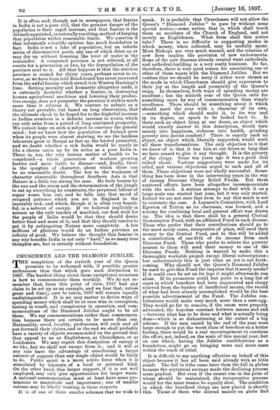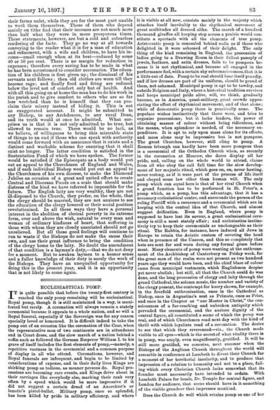CHURCHMEN AND THE DIAMOND J UBILEE.
THE completion of the sixtieth year of the Queen promises to be welcomed with, if possible, greater enthusiasm than that which gave such distinction to 1887. The hardest thing about these exceptional occasions is how to commemorate them worthily. We do not re- member that, from this point of view, 1887 had any claim to be set up as an example, and we fear that, unless great and timely care be taken, 1897 will remain equally undistinguished. It is no easy matter to devise ways of spending money which shall be at once wise in conception, lasting in result, and conspicuous in operation, and com- memorations of the Diamond Jubilee ought to be all these. We say commemorations rather than commemora- tion because there are certain to be more than one. Nationality, creed, locality, professions, will each and all put forward their claims, and in the end we shall probably have a variety of objects recommended on the ground that they appeal to us as Englishmen, as Churchmen, or as Londoners. We may regret this dissipation of energy if we like, but we shall not escape from it ; and it will at any rate have the advantage of conciliating a larger amount of support than any single object would be likely to do. Public spirit is a more active force when it is stimulated by interests of a local or personal kind. On the other hand, this larger support, if it is not well employed, may only give opportunities for larger waste. A national commemoration must at least have some pre- tensions to magnitude and importance ; one of smaller volume may be wholly wanting in these respects.
It is of one of these smaller schemes that we wish to speak. It is probable that Churchmen will not allow the Queen's "Diamond Jubilee" to pass by without some special notice,—some notice, that is, which shall touch them as members of the Church of England, and not merely as Englishmen. What form shall this notice take ? There is no difficulty in suggesting modes in which money, when collected, may be usefully spent. More Bishops are very much wanted, and the creation of new Sees implies the provision of new endowments. Some of the new dioceses already created want cathedrals, and cathedral-building is a very costly business. So far, therefore, there is very good reason for associating one or other of these wants with the Diamond Jubilee. But we confess that we should be sorry if either were chosen as the mode in which Churchmen should give expression to their joy at the length and prosperity of the Queen's reign. In themselves, both ways of spending money are excellent ; but the sixtieth year of the Queen calls for something more by way of commemoration than simple excellence. There should be something about it which should mark the year with a character of its own, —something which should make it, in its way and in its degree, an epoch to be looked back to. Is there such an object lying at our doors, an object which would exactly answer to this description, would turn misery into happiness, sickness into health, grinding poverty into decent comfort ? There is exactly such an object, an object which, liberally supported, would work all these transformations. The only objection to it that we know of is that it has lain at our doors so long that we have ceased to give it any thought. It is the poverty of the clergy. Some ten years ago it was a good deal talked about. Various suggestions were made for its relief, and various objections urged to each and all of them. These objections were not wholly successful. Some- thing has been done in the intervening years in the way of raising Diocesan Clergy Relief Funds. But these scattered efforts have been altogether incommensurate with the need. A serious attempt to deal with it on a large scale was started last year, but it was only started. Indeed we are not sure that even to say this much is not to overstate the case. A Laymen's Committee, with Lord Egerton of Tatton as its chairman, was formed, and a scheme for combining local and general effort was drawn up. The idea is that there shall be a general Clerical Sustentation Fund, with an affiliated Fund in each diocese. Those who prefer that their contributions should go to the most needy cases, irrespective of place, will send their money to the Central Fund, and to this will be added a contribution of one-fifth of its income from each Diocesan Fund. Those who prefer to relieve the poverty nearest to them will send their money to one of the Diocesan Funds. Nothing is wanted to make this a, thoroughly workable project except liberal subscriptions ; but unfortunately this is just what as yet is not forth- coming. Why should not the Queen's Diamond Jubilee be used to give this Fund the impetus that it sorely needs? If it could once be set on its legs it might afterwards run alone. If its promoters could but point to a long list of cases in which benefices had been augmented and clergy relieved from the burden of insufficient means, the record of what had been already accomplished would be the best possible advertisement of the Fund. The Jubilee con- tributions would make very much more than a nest-egg. They would go far to remove, if the cause were properly advocated, the hopeless contrast between means and end —between what has to be done and what is actually being done—which is so disheartening at the outset of a big scheme. If the sum raised by the end of the year were large enough to put the worst class of benefices on a better footing, there would be a real encouragement to continue the effort, not, indeed, on the scale of this special year, but on one which, having the Jubilee contributions as a foundation, might go on bringing more and more cases within the reach of relief.
It is difficult to say anything effective on behalf of this object because it has all been said already with so little result. The fall in tithe came later than the fall in glebes because the septennial average made the declining process more gradual. But even if the recent rise in the price of wheat should be maintained, the recuperative process would for the same reason be equally slow. The condition in which the beneficed clergy are now placed is shortly this. Those of them who depend mainly on glebe find their farms unlet, while they are for the most part unable to work them themselves. Those of them who depend mainly on tithe find that their incomes are not much more than half what they were in more prosperous times. These statements, however, are but a cold and colourless rendering of the facts. They go no way at all towards conveying to the reader what it is for a man of education and refinement, with a wife and children, to have his in- come—small enough when at its best—reduced by some 40 or 50 per cent. There is no margin for reduction in expenses ; therefore every saving has to be made in what he has been accustomed to consider necessaries. The educa- tion of his children is first given up ; the dismissal of his servants next follows ; then old clothes are worn till they become rags ; and finally food and firing are reduced below the level not of comfort only but of health. And with all this going on at home the man has to do his work in the parish and to give comfort to others who are so far less wretched than he is himself that they can pro- claim their misery instead of hiding it. This is not an exaggerated account. It might be submitted to any Bishop, to any Archdeacon, to any rural Dean, and its truth would at once be admitted. What sur- prises us is that it is not only admitted to be true, but allowed to remain true. There would be no lack, as we believe, of willingness to bring this miserable state of things to an end if those who can speak with authority would come forward with an assurance that it exists and a distinct and workable scheme for ensuring that it shall exist no longer. The latter condition is satisfied in the Sustentation Fund of which we have spoken. The former would be satisfied if the Episcopate as a body would put out an appeal to the Churchmen of England and Wales, and if each individual Bishop would put out an appeal to the Churchmen of his own diocese, to make the Diamond Jubilee an occasion of a great and united effort to create Central and Diocesan Funds on a scale that should make distress of the kind we have referred to impossible for the future. The English laity are very wealthy, they are not ill-disposed to the Church, they prefer, on the whole, that the clergy should be married, they are not anxious to see the education of the clergy lowered or their social position revolutionised. In all these ways they have a personal interest in the abolition of clerical poverty in its extreme form, over and above the wish, natural to every man and woman of ordinary kindness of heart, that suffering in those with whom they are closely associated should not go unrelieved. But all these good feelings will continue to run to waste if the Bishops do not make the cause their own, and use their great influence to bring the condition of the clergy home to the laity. No doubt the amendment of that condition is a layman's duty,—that we do not deny for a moment. But to awaken laymen to a keener sense and a, fuller knowledge of their duty is surely the work of the Bishops. They have an unequalled opportunity for doing this in the present year, and it is an opportunity that is not likely to come again.







































 Previous page
Previous page